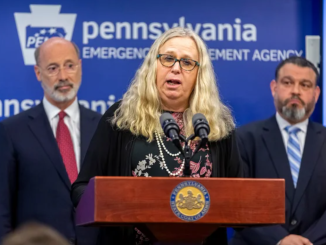
At least two Amazon workers have resigned in protest at the company’s decision to keep selling a book employees say compares being transgender to a mental illness.
A complaint posted to an internal message board in April gained the support of more than 467 corporate Amazon employees, NBC News reported.
The company is the second-largest employer in the US and has more than 1.3 million workers globally.
The complaint cites a decision from March when Amazon told a group of Republican Senators that the company had “chosen not to sell books that frame LGBTQ+ identity as a mental illness”.
A petition by employees calls for the book Irreversible Damage: The Transgender Craze Seducing Our Daughters by Abigail Shrier to be removed from the site.
Ms Shrier writes in the book that a “trans epidemic” is taking place among young girls.
In Amazon’s category for “LGBTQ+ Demographic Studies,” the book holds the three top spots on the bestseller list with its hardcover, softcover, and Kindle editions.
Ms Shrier has pushed back on the notion that her book frames identifying as LGBT+ as a mental illness, but Amazon employees have noted a passage in which she writes: “Many of the adolescent girls suddenly identifying as transgender seemed to be caught in a ‘craze’ – a cultural enthusiasm that spreads like a virus”.
Ms Shrier then writes that a craze is a “crowd mental illness”. She also compares therapists who affirm the gender of transgender patients to a therapist who affirms a person’s anorexia by telling them that they are fat.
“We wouldn’t think such a therapist was compassionate. We might think she was a monster,” Ms Shrier writes.
Selene Xenia, who identifies as transgender, was a software engineer at Amazon but decided to resign as the company continued to sell the book.
She was happy that Amazon stopped selling When Harry Became Sally: Responding to the Transgender Moment, but resigned in June because Irreversible Damage had not been removed.
“The book literally has [craze] in the title and considers being transgender a mental illness in many senses throughout the book,” Ms Xenia told NBC News.
“I found it extremely hypocritical for Amazon to say that it would stock this book and not another similar one,” she added. “It looks like Amazon had to remove that particular book for PR reasons, not because they felt morally obligated to.”
Ms Shrier told NBC in a statement: “This issue won’t go away just because some disgruntled Amazon employees wish it would. And banning the book won’t help these girls or anyone else.
“My book goes out of its way to honour the experiences of transgender adults, never disparages them, and never implies that the trans identity is a mental illness.”
She tweeted in early May: “Anyone who thinks my book ‘advances a narrative of transgender identity as a disease’ hasn’t read it, or is a bona fide idiot.”
Amazon spokeswoman Cecelia Fan told NBC News in a statement: “As a bookseller, we believe that providing access to written speech and a variety of viewpoints is one of the most important things we do – even when those viewpoints differ from our own or Amazon’s stated positions.”
In an internal thread concerning the complaint, one employee wrote: “Due to our success and scale, our customers will come to us seeking to educate themselves about their transgender children. We have a responsibility to make sure that we do not use our powerful market position to amplify the harm this book causes.”
Dr Erica Anderson is the president of the United States Professional Association for Transgender Health and a clinical psychologist at the Child and Adolescent Gender Centre.
She told NBC that her “concern is that people would look to this book for guidance about these things rather than the professional societies, including my own, which all observe and have for some years that gender-affirming care for youth is medically necessary and that there is a scientific basis for providing such care, which in some cases is lifesaving for young people”.
*story by The Independent


